HS3202 - Analyzing Conflict Management in Nursing Practice
VerifiedAdded on 2023/06/10
|8
|2089
|168
Essay
AI Summary
This essay provides an analysis of conflict management within a clinical nursing experience. It describes a situation where a junior nurse experiences conflict with a senior nurse, impacting the junior nurse's learning and professional development. The essay applies a four-step conflict resolution process, including focusing on the issue, letting go of the past, exploring needs, and working collaboratively. It discusses the implications of unresolved conflict on patient safety, nurse morale, and professional ethics, referencing the SNB Code for Nurses and Midwives. The conclusion emphasizes the importance of effective conflict management techniques to ensure a smooth workflow and optimal patient care, highlighting the need for nurses to resolve conflicts to maintain their mental and emotional stability and uphold organizational goals.
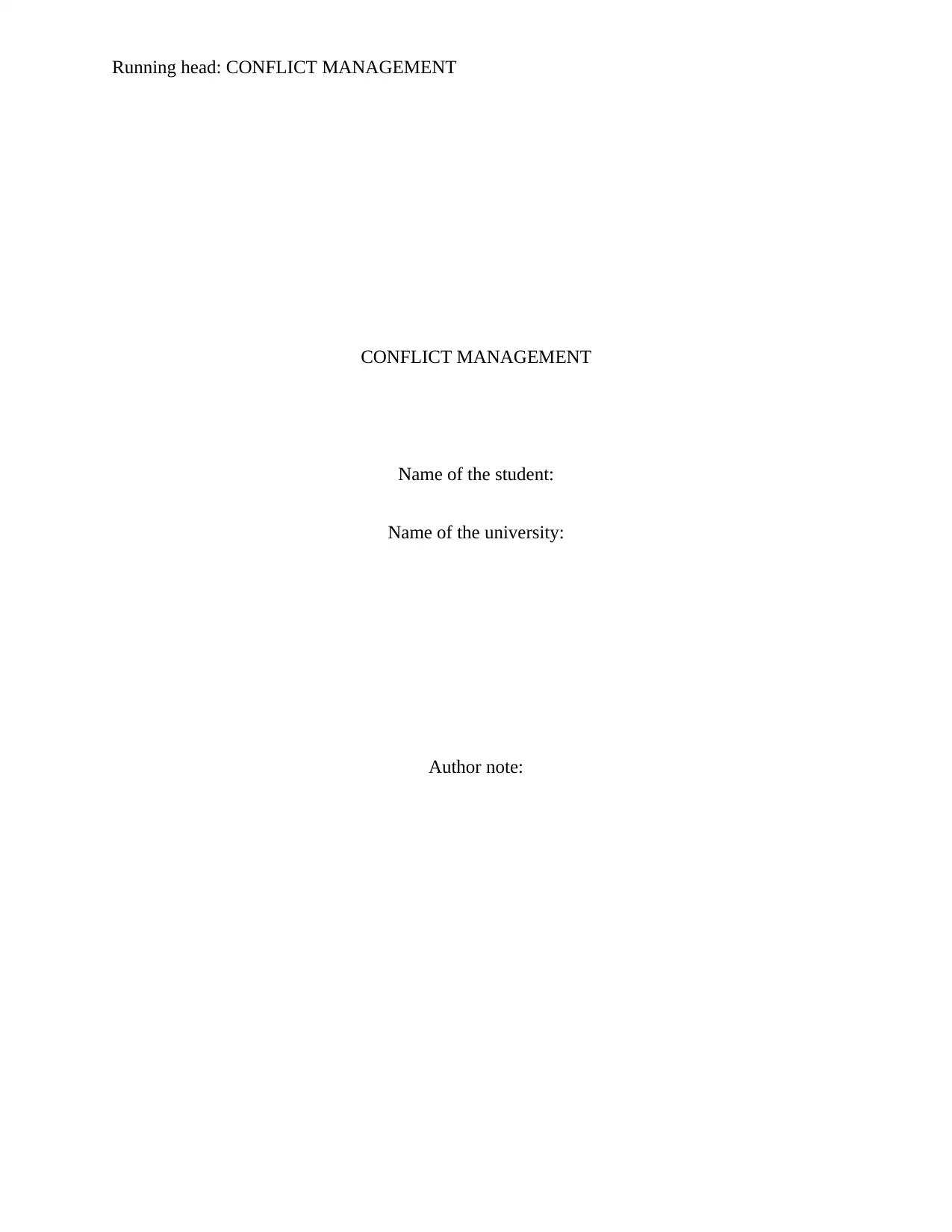
Running head: CONFLICT MANAGEMENT
CONFLICT MANAGEMENT
Name of the student:
Name of the university:
Author note:
CONFLICT MANAGEMENT
Name of the student:
Name of the university:
Author note:
Paraphrase This Document
Need a fresh take? Get an instant paraphrase of this document with our AI Paraphraser
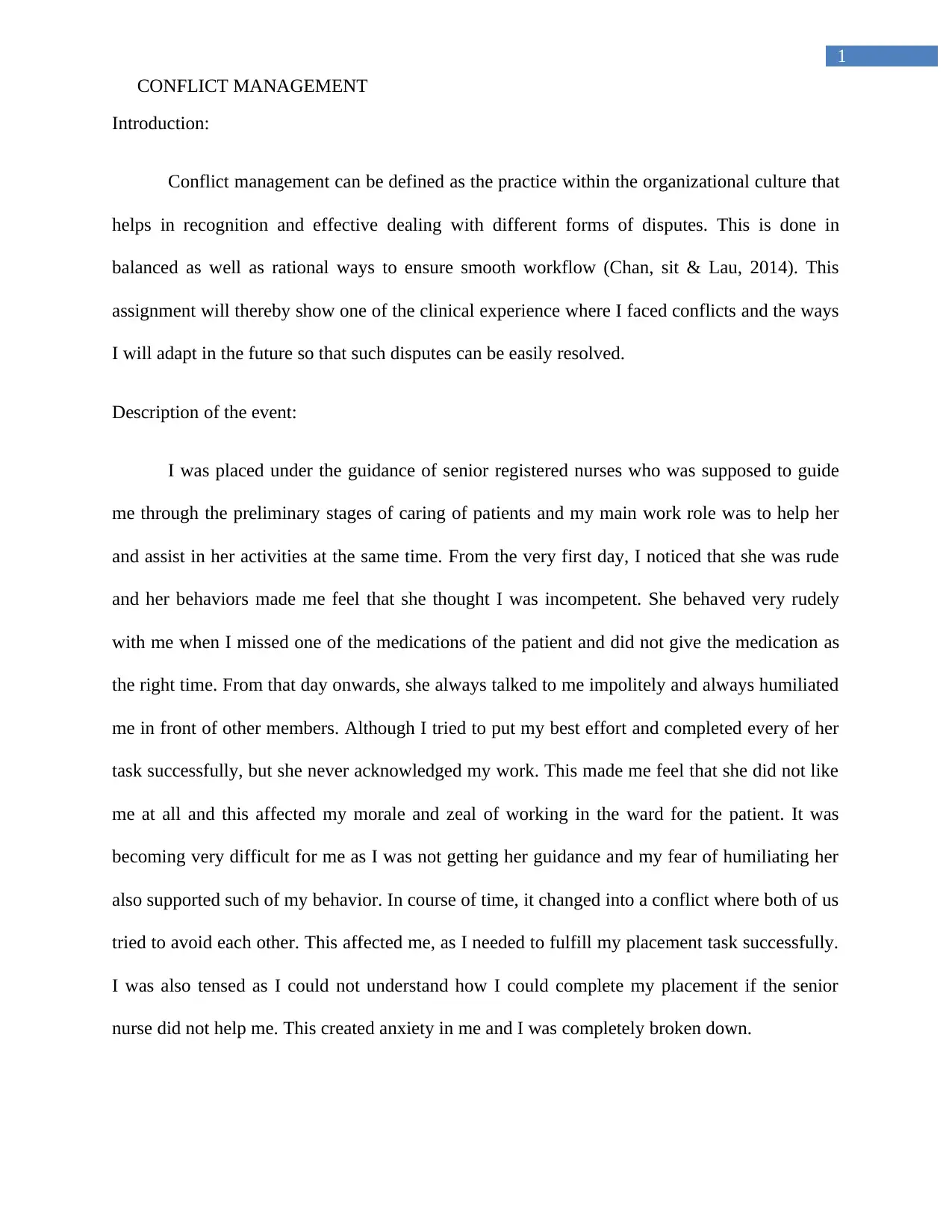
1
CONFLICT MANAGEMENT
Introduction:
Conflict management can be defined as the practice within the organizational culture that
helps in recognition and effective dealing with different forms of disputes. This is done in
balanced as well as rational ways to ensure smooth workflow (Chan, sit & Lau, 2014). This
assignment will thereby show one of the clinical experience where I faced conflicts and the ways
I will adapt in the future so that such disputes can be easily resolved.
Description of the event:
I was placed under the guidance of senior registered nurses who was supposed to guide
me through the preliminary stages of caring of patients and my main work role was to help her
and assist in her activities at the same time. From the very first day, I noticed that she was rude
and her behaviors made me feel that she thought I was incompetent. She behaved very rudely
with me when I missed one of the medications of the patient and did not give the medication as
the right time. From that day onwards, she always talked to me impolitely and always humiliated
me in front of other members. Although I tried to put my best effort and completed every of her
task successfully, but she never acknowledged my work. This made me feel that she did not like
me at all and this affected my morale and zeal of working in the ward for the patient. It was
becoming very difficult for me as I was not getting her guidance and my fear of humiliating her
also supported such of my behavior. In course of time, it changed into a conflict where both of us
tried to avoid each other. This affected me, as I needed to fulfill my placement task successfully.
I was also tensed as I could not understand how I could complete my placement if the senior
nurse did not help me. This created anxiety in me and I was completely broken down.
CONFLICT MANAGEMENT
Introduction:
Conflict management can be defined as the practice within the organizational culture that
helps in recognition and effective dealing with different forms of disputes. This is done in
balanced as well as rational ways to ensure smooth workflow (Chan, sit & Lau, 2014). This
assignment will thereby show one of the clinical experience where I faced conflicts and the ways
I will adapt in the future so that such disputes can be easily resolved.
Description of the event:
I was placed under the guidance of senior registered nurses who was supposed to guide
me through the preliminary stages of caring of patients and my main work role was to help her
and assist in her activities at the same time. From the very first day, I noticed that she was rude
and her behaviors made me feel that she thought I was incompetent. She behaved very rudely
with me when I missed one of the medications of the patient and did not give the medication as
the right time. From that day onwards, she always talked to me impolitely and always humiliated
me in front of other members. Although I tried to put my best effort and completed every of her
task successfully, but she never acknowledged my work. This made me feel that she did not like
me at all and this affected my morale and zeal of working in the ward for the patient. It was
becoming very difficult for me as I was not getting her guidance and my fear of humiliating her
also supported such of my behavior. In course of time, it changed into a conflict where both of us
tried to avoid each other. This affected me, as I needed to fulfill my placement task successfully.
I was also tensed as I could not understand how I could complete my placement if the senior
nurse did not help me. This created anxiety in me and I was completely broken down.
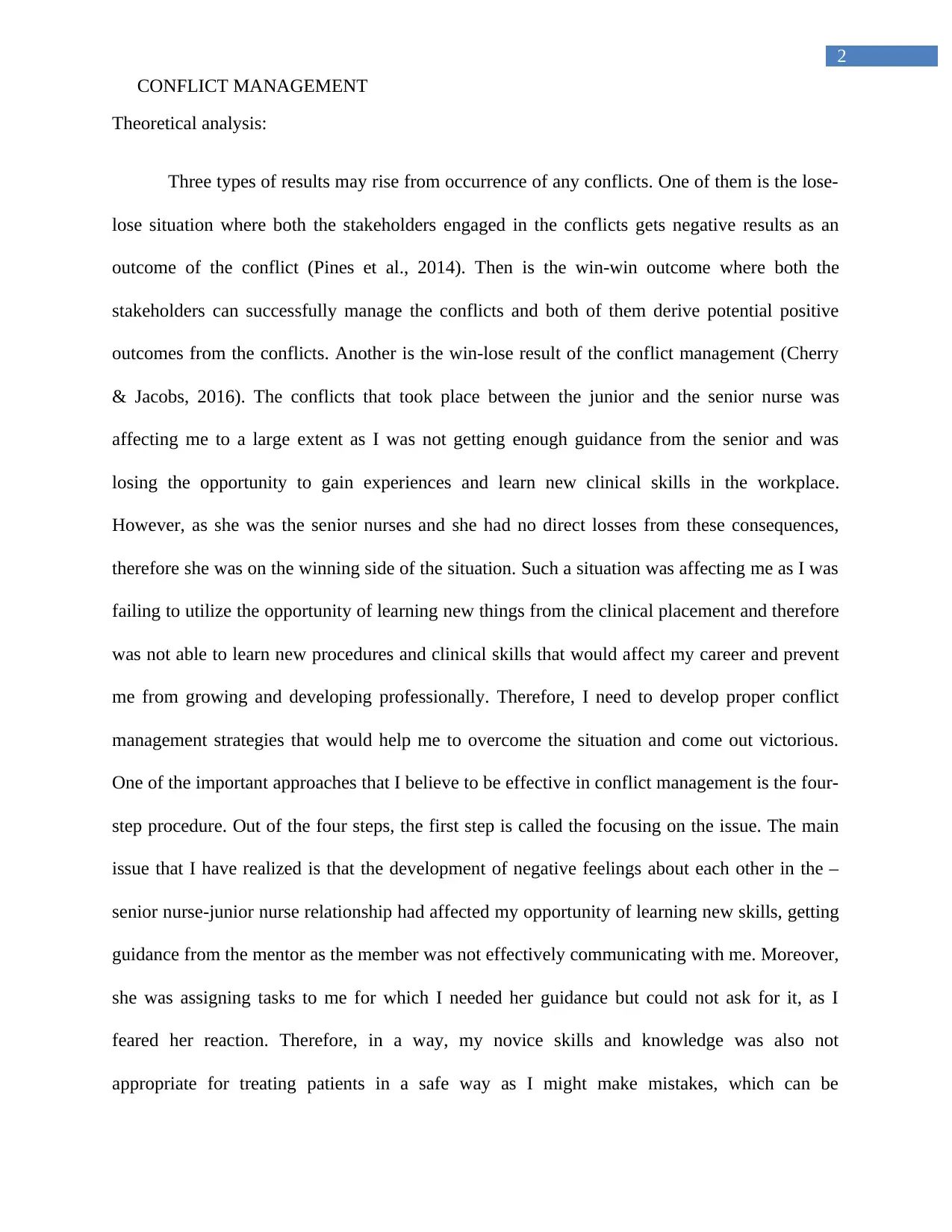
2
CONFLICT MANAGEMENT
Theoretical analysis:
Three types of results may rise from occurrence of any conflicts. One of them is the lose-
lose situation where both the stakeholders engaged in the conflicts gets negative results as an
outcome of the conflict (Pines et al., 2014). Then is the win-win outcome where both the
stakeholders can successfully manage the conflicts and both of them derive potential positive
outcomes from the conflicts. Another is the win-lose result of the conflict management (Cherry
& Jacobs, 2016). The conflicts that took place between the junior and the senior nurse was
affecting me to a large extent as I was not getting enough guidance from the senior and was
losing the opportunity to gain experiences and learn new clinical skills in the workplace.
However, as she was the senior nurses and she had no direct losses from these consequences,
therefore she was on the winning side of the situation. Such a situation was affecting me as I was
failing to utilize the opportunity of learning new things from the clinical placement and therefore
was not able to learn new procedures and clinical skills that would affect my career and prevent
me from growing and developing professionally. Therefore, I need to develop proper conflict
management strategies that would help me to overcome the situation and come out victorious.
One of the important approaches that I believe to be effective in conflict management is the four-
step procedure. Out of the four steps, the first step is called the focusing on the issue. The main
issue that I have realized is that the development of negative feelings about each other in the –
senior nurse-junior nurse relationship had affected my opportunity of learning new skills, getting
guidance from the mentor as the member was not effectively communicating with me. Moreover,
she was assigning tasks to me for which I needed her guidance but could not ask for it, as I
feared her reaction. Therefore, in a way, my novice skills and knowledge was also not
appropriate for treating patients in a safe way as I might make mistakes, which can be
CONFLICT MANAGEMENT
Theoretical analysis:
Three types of results may rise from occurrence of any conflicts. One of them is the lose-
lose situation where both the stakeholders engaged in the conflicts gets negative results as an
outcome of the conflict (Pines et al., 2014). Then is the win-win outcome where both the
stakeholders can successfully manage the conflicts and both of them derive potential positive
outcomes from the conflicts. Another is the win-lose result of the conflict management (Cherry
& Jacobs, 2016). The conflicts that took place between the junior and the senior nurse was
affecting me to a large extent as I was not getting enough guidance from the senior and was
losing the opportunity to gain experiences and learn new clinical skills in the workplace.
However, as she was the senior nurses and she had no direct losses from these consequences,
therefore she was on the winning side of the situation. Such a situation was affecting me as I was
failing to utilize the opportunity of learning new things from the clinical placement and therefore
was not able to learn new procedures and clinical skills that would affect my career and prevent
me from growing and developing professionally. Therefore, I need to develop proper conflict
management strategies that would help me to overcome the situation and come out victorious.
One of the important approaches that I believe to be effective in conflict management is the four-
step procedure. Out of the four steps, the first step is called the focusing on the issue. The main
issue that I have realized is that the development of negative feelings about each other in the –
senior nurse-junior nurse relationship had affected my opportunity of learning new skills, getting
guidance from the mentor as the member was not effectively communicating with me. Moreover,
she was assigning tasks to me for which I needed her guidance but could not ask for it, as I
feared her reaction. Therefore, in a way, my novice skills and knowledge was also not
appropriate for treating patients in a safe way as I might make mistakes, which can be
⊘ This is a preview!⊘
Do you want full access?
Subscribe today to unlock all pages.

Trusted by 1+ million students worldwide
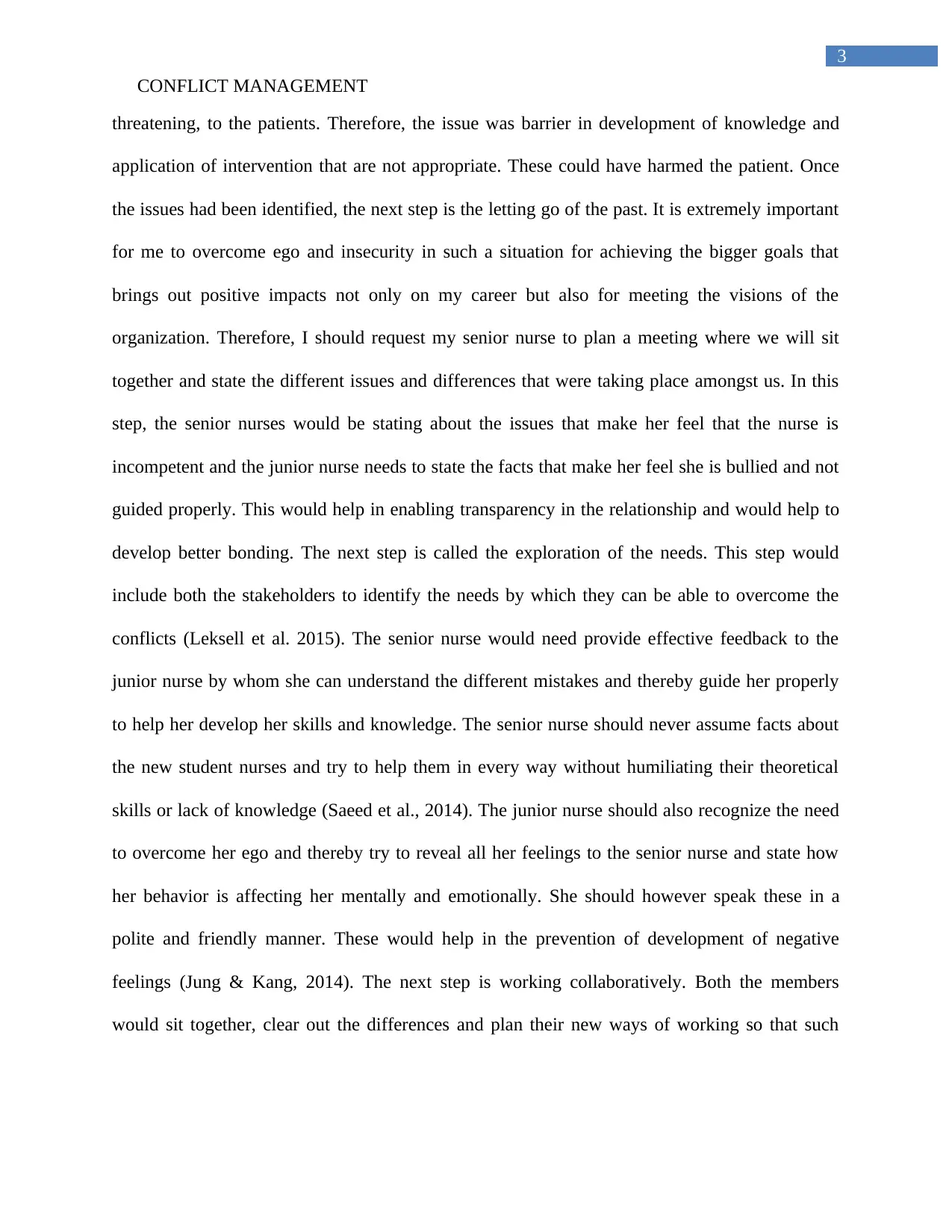
3
CONFLICT MANAGEMENT
threatening, to the patients. Therefore, the issue was barrier in development of knowledge and
application of intervention that are not appropriate. These could have harmed the patient. Once
the issues had been identified, the next step is the letting go of the past. It is extremely important
for me to overcome ego and insecurity in such a situation for achieving the bigger goals that
brings out positive impacts not only on my career but also for meeting the visions of the
organization. Therefore, I should request my senior nurse to plan a meeting where we will sit
together and state the different issues and differences that were taking place amongst us. In this
step, the senior nurses would be stating about the issues that make her feel that the nurse is
incompetent and the junior nurse needs to state the facts that make her feel she is bullied and not
guided properly. This would help in enabling transparency in the relationship and would help to
develop better bonding. The next step is called the exploration of the needs. This step would
include both the stakeholders to identify the needs by which they can be able to overcome the
conflicts (Leksell et al. 2015). The senior nurse would need provide effective feedback to the
junior nurse by whom she can understand the different mistakes and thereby guide her properly
to help her develop her skills and knowledge. The senior nurse should never assume facts about
the new student nurses and try to help them in every way without humiliating their theoretical
skills or lack of knowledge (Saeed et al., 2014). The junior nurse should also recognize the need
to overcome her ego and thereby try to reveal all her feelings to the senior nurse and state how
her behavior is affecting her mentally and emotionally. She should however speak these in a
polite and friendly manner. These would help in the prevention of development of negative
feelings (Jung & Kang, 2014). The next step is working collaboratively. Both the members
would sit together, clear out the differences and plan their new ways of working so that such
CONFLICT MANAGEMENT
threatening, to the patients. Therefore, the issue was barrier in development of knowledge and
application of intervention that are not appropriate. These could have harmed the patient. Once
the issues had been identified, the next step is the letting go of the past. It is extremely important
for me to overcome ego and insecurity in such a situation for achieving the bigger goals that
brings out positive impacts not only on my career but also for meeting the visions of the
organization. Therefore, I should request my senior nurse to plan a meeting where we will sit
together and state the different issues and differences that were taking place amongst us. In this
step, the senior nurses would be stating about the issues that make her feel that the nurse is
incompetent and the junior nurse needs to state the facts that make her feel she is bullied and not
guided properly. This would help in enabling transparency in the relationship and would help to
develop better bonding. The next step is called the exploration of the needs. This step would
include both the stakeholders to identify the needs by which they can be able to overcome the
conflicts (Leksell et al. 2015). The senior nurse would need provide effective feedback to the
junior nurse by whom she can understand the different mistakes and thereby guide her properly
to help her develop her skills and knowledge. The senior nurse should never assume facts about
the new student nurses and try to help them in every way without humiliating their theoretical
skills or lack of knowledge (Saeed et al., 2014). The junior nurse should also recognize the need
to overcome her ego and thereby try to reveal all her feelings to the senior nurse and state how
her behavior is affecting her mentally and emotionally. She should however speak these in a
polite and friendly manner. These would help in the prevention of development of negative
feelings (Jung & Kang, 2014). The next step is working collaboratively. Both the members
would sit together, clear out the differences and plan their new ways of working so that such
Paraphrase This Document
Need a fresh take? Get an instant paraphrase of this document with our AI Paraphraser
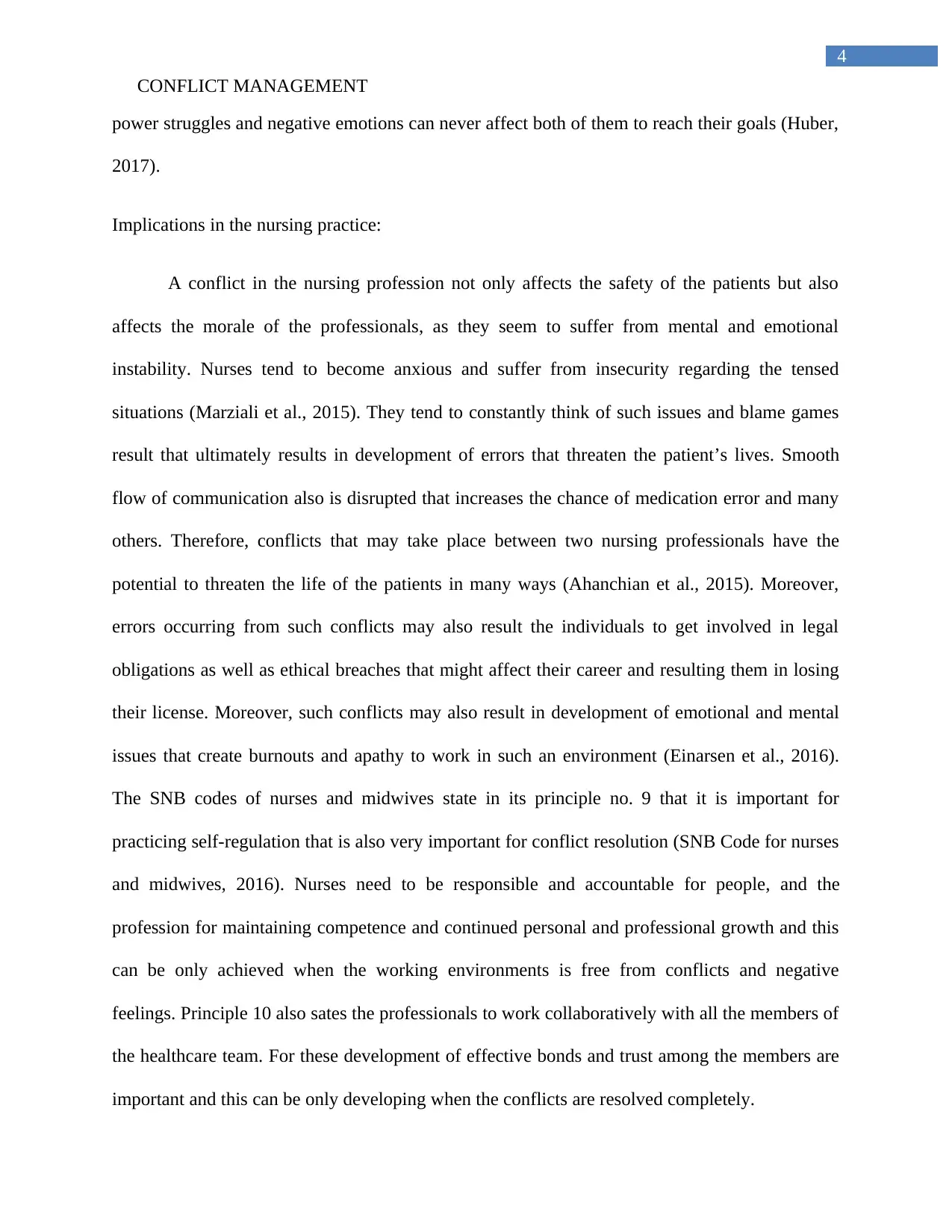
4
CONFLICT MANAGEMENT
power struggles and negative emotions can never affect both of them to reach their goals (Huber,
2017).
Implications in the nursing practice:
A conflict in the nursing profession not only affects the safety of the patients but also
affects the morale of the professionals, as they seem to suffer from mental and emotional
instability. Nurses tend to become anxious and suffer from insecurity regarding the tensed
situations (Marziali et al., 2015). They tend to constantly think of such issues and blame games
result that ultimately results in development of errors that threaten the patient’s lives. Smooth
flow of communication also is disrupted that increases the chance of medication error and many
others. Therefore, conflicts that may take place between two nursing professionals have the
potential to threaten the life of the patients in many ways (Ahanchian et al., 2015). Moreover,
errors occurring from such conflicts may also result the individuals to get involved in legal
obligations as well as ethical breaches that might affect their career and resulting them in losing
their license. Moreover, such conflicts may also result in development of emotional and mental
issues that create burnouts and apathy to work in such an environment (Einarsen et al., 2016).
The SNB codes of nurses and midwives state in its principle no. 9 that it is important for
practicing self-regulation that is also very important for conflict resolution (SNB Code for nurses
and midwives, 2016). Nurses need to be responsible and accountable for people, and the
profession for maintaining competence and continued personal and professional growth and this
can be only achieved when the working environments is free from conflicts and negative
feelings. Principle 10 also sates the professionals to work collaboratively with all the members of
the healthcare team. For these development of effective bonds and trust among the members are
important and this can be only developing when the conflicts are resolved completely.
CONFLICT MANAGEMENT
power struggles and negative emotions can never affect both of them to reach their goals (Huber,
2017).
Implications in the nursing practice:
A conflict in the nursing profession not only affects the safety of the patients but also
affects the morale of the professionals, as they seem to suffer from mental and emotional
instability. Nurses tend to become anxious and suffer from insecurity regarding the tensed
situations (Marziali et al., 2015). They tend to constantly think of such issues and blame games
result that ultimately results in development of errors that threaten the patient’s lives. Smooth
flow of communication also is disrupted that increases the chance of medication error and many
others. Therefore, conflicts that may take place between two nursing professionals have the
potential to threaten the life of the patients in many ways (Ahanchian et al., 2015). Moreover,
errors occurring from such conflicts may also result the individuals to get involved in legal
obligations as well as ethical breaches that might affect their career and resulting them in losing
their license. Moreover, such conflicts may also result in development of emotional and mental
issues that create burnouts and apathy to work in such an environment (Einarsen et al., 2016).
The SNB codes of nurses and midwives state in its principle no. 9 that it is important for
practicing self-regulation that is also very important for conflict resolution (SNB Code for nurses
and midwives, 2016). Nurses need to be responsible and accountable for people, and the
profession for maintaining competence and continued personal and professional growth and this
can be only achieved when the working environments is free from conflicts and negative
feelings. Principle 10 also sates the professionals to work collaboratively with all the members of
the healthcare team. For these development of effective bonds and trust among the members are
important and this can be only developing when the conflicts are resolved completely.
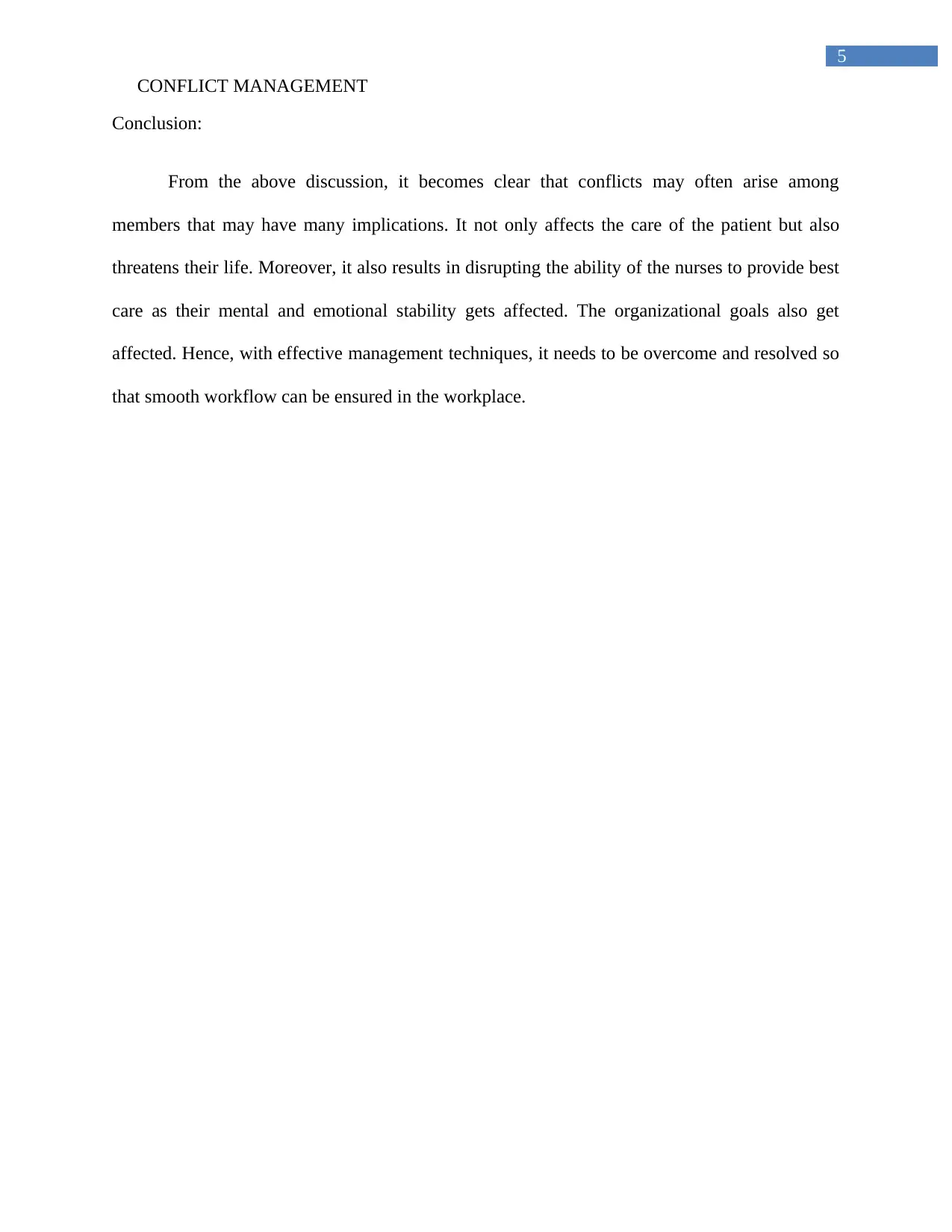
5
CONFLICT MANAGEMENT
Conclusion:
From the above discussion, it becomes clear that conflicts may often arise among
members that may have many implications. It not only affects the care of the patient but also
threatens their life. Moreover, it also results in disrupting the ability of the nurses to provide best
care as their mental and emotional stability gets affected. The organizational goals also get
affected. Hence, with effective management techniques, it needs to be overcome and resolved so
that smooth workflow can be ensured in the workplace.
CONFLICT MANAGEMENT
Conclusion:
From the above discussion, it becomes clear that conflicts may often arise among
members that may have many implications. It not only affects the care of the patient but also
threatens their life. Moreover, it also results in disrupting the ability of the nurses to provide best
care as their mental and emotional stability gets affected. The organizational goals also get
affected. Hence, with effective management techniques, it needs to be overcome and resolved so
that smooth workflow can be ensured in the workplace.
⊘ This is a preview!⊘
Do you want full access?
Subscribe today to unlock all pages.

Trusted by 1+ million students worldwide
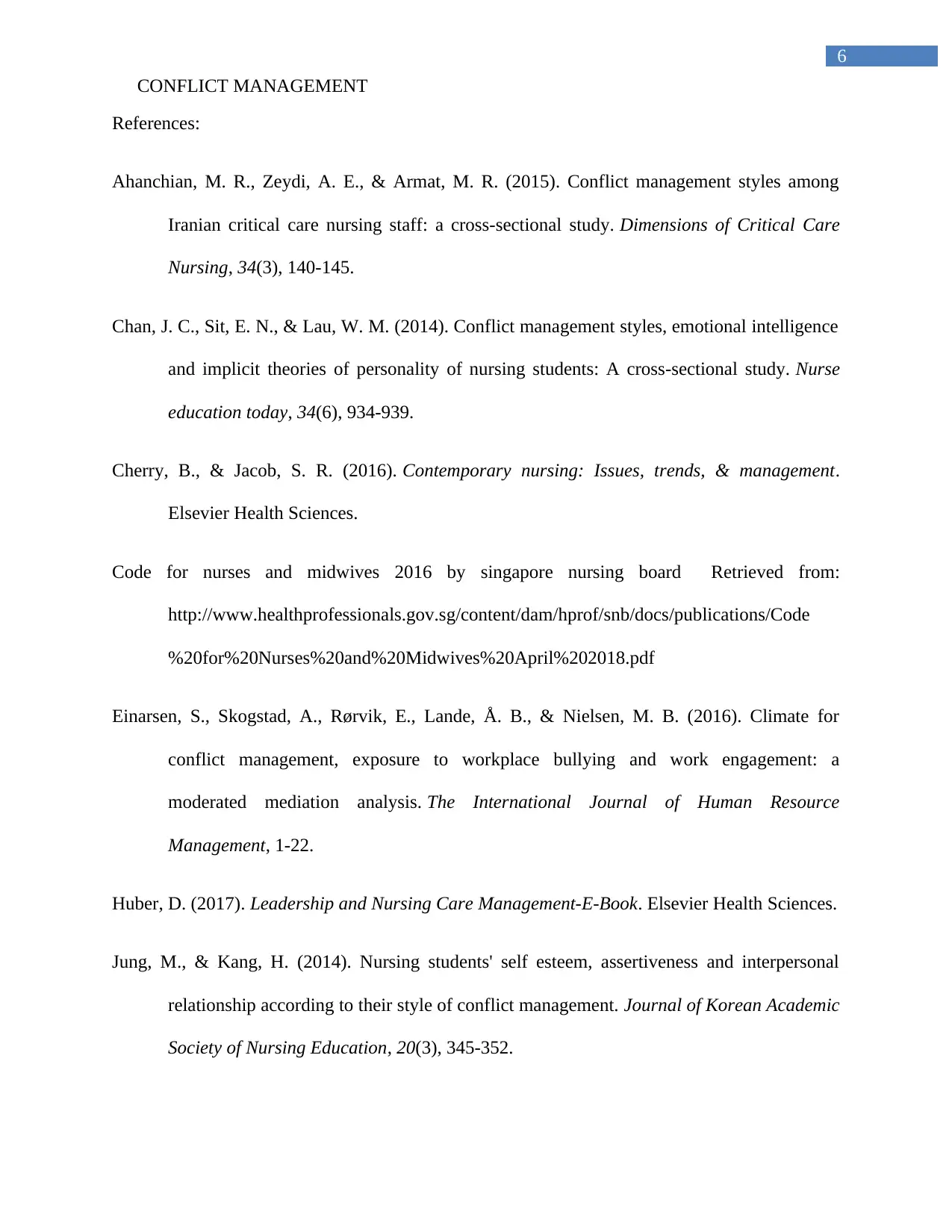
6
CONFLICT MANAGEMENT
References:
Ahanchian, M. R., Zeydi, A. E., & Armat, M. R. (2015). Conflict management styles among
Iranian critical care nursing staff: a cross-sectional study. Dimensions of Critical Care
Nursing, 34(3), 140-145.
Chan, J. C., Sit, E. N., & Lau, W. M. (2014). Conflict management styles, emotional intelligence
and implicit theories of personality of nursing students: A cross-sectional study. Nurse
education today, 34(6), 934-939.
Cherry, B., & Jacob, S. R. (2016). Contemporary nursing: Issues, trends, & management.
Elsevier Health Sciences.
Code for nurses and midwives 2016 by singapore nursing board Retrieved from:
http://www.healthprofessionals.gov.sg/content/dam/hprof/snb/docs/publications/Code
%20for%20Nurses%20and%20Midwives%20April%202018.pdf
Einarsen, S., Skogstad, A., Rørvik, E., Lande, Å. B., & Nielsen, M. B. (2016). Climate for
conflict management, exposure to workplace bullying and work engagement: a
moderated mediation analysis. The International Journal of Human Resource
Management, 1-22.
Huber, D. (2017). Leadership and Nursing Care Management-E-Book. Elsevier Health Sciences.
Jung, M., & Kang, H. (2014). Nursing students' self esteem, assertiveness and interpersonal
relationship according to their style of conflict management. Journal of Korean Academic
Society of Nursing Education, 20(3), 345-352.
CONFLICT MANAGEMENT
References:
Ahanchian, M. R., Zeydi, A. E., & Armat, M. R. (2015). Conflict management styles among
Iranian critical care nursing staff: a cross-sectional study. Dimensions of Critical Care
Nursing, 34(3), 140-145.
Chan, J. C., Sit, E. N., & Lau, W. M. (2014). Conflict management styles, emotional intelligence
and implicit theories of personality of nursing students: A cross-sectional study. Nurse
education today, 34(6), 934-939.
Cherry, B., & Jacob, S. R. (2016). Contemporary nursing: Issues, trends, & management.
Elsevier Health Sciences.
Code for nurses and midwives 2016 by singapore nursing board Retrieved from:
http://www.healthprofessionals.gov.sg/content/dam/hprof/snb/docs/publications/Code
%20for%20Nurses%20and%20Midwives%20April%202018.pdf
Einarsen, S., Skogstad, A., Rørvik, E., Lande, Å. B., & Nielsen, M. B. (2016). Climate for
conflict management, exposure to workplace bullying and work engagement: a
moderated mediation analysis. The International Journal of Human Resource
Management, 1-22.
Huber, D. (2017). Leadership and Nursing Care Management-E-Book. Elsevier Health Sciences.
Jung, M., & Kang, H. (2014). Nursing students' self esteem, assertiveness and interpersonal
relationship according to their style of conflict management. Journal of Korean Academic
Society of Nursing Education, 20(3), 345-352.
Paraphrase This Document
Need a fresh take? Get an instant paraphrase of this document with our AI Paraphraser
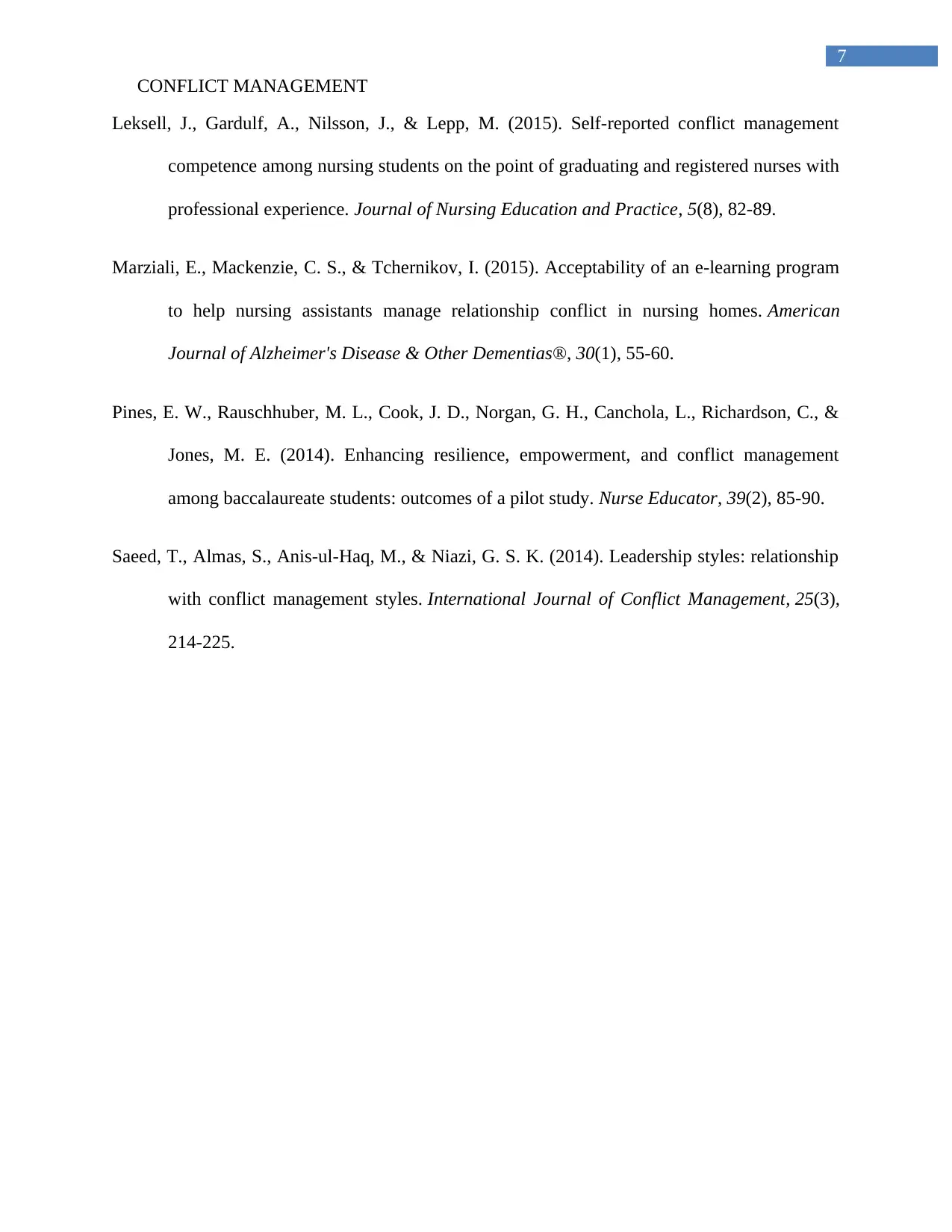
7
CONFLICT MANAGEMENT
Leksell, J., Gardulf, A., Nilsson, J., & Lepp, M. (2015). Self-reported conflict management
competence among nursing students on the point of graduating and registered nurses with
professional experience. Journal of Nursing Education and Practice, 5(8), 82-89.
Marziali, E., Mackenzie, C. S., & Tchernikov, I. (2015). Acceptability of an e-learning program
to help nursing assistants manage relationship conflict in nursing homes. American
Journal of Alzheimer's Disease & Other Dementias®, 30(1), 55-60.
Pines, E. W., Rauschhuber, M. L., Cook, J. D., Norgan, G. H., Canchola, L., Richardson, C., &
Jones, M. E. (2014). Enhancing resilience, empowerment, and conflict management
among baccalaureate students: outcomes of a pilot study. Nurse Educator, 39(2), 85-90.
Saeed, T., Almas, S., Anis-ul-Haq, M., & Niazi, G. S. K. (2014). Leadership styles: relationship
with conflict management styles. International Journal of Conflict Management, 25(3),
214-225.
CONFLICT MANAGEMENT
Leksell, J., Gardulf, A., Nilsson, J., & Lepp, M. (2015). Self-reported conflict management
competence among nursing students on the point of graduating and registered nurses with
professional experience. Journal of Nursing Education and Practice, 5(8), 82-89.
Marziali, E., Mackenzie, C. S., & Tchernikov, I. (2015). Acceptability of an e-learning program
to help nursing assistants manage relationship conflict in nursing homes. American
Journal of Alzheimer's Disease & Other Dementias®, 30(1), 55-60.
Pines, E. W., Rauschhuber, M. L., Cook, J. D., Norgan, G. H., Canchola, L., Richardson, C., &
Jones, M. E. (2014). Enhancing resilience, empowerment, and conflict management
among baccalaureate students: outcomes of a pilot study. Nurse Educator, 39(2), 85-90.
Saeed, T., Almas, S., Anis-ul-Haq, M., & Niazi, G. S. K. (2014). Leadership styles: relationship
with conflict management styles. International Journal of Conflict Management, 25(3),
214-225.
1 out of 8
Related Documents
Your All-in-One AI-Powered Toolkit for Academic Success.
+13062052269
info@desklib.com
Available 24*7 on WhatsApp / Email
![[object Object]](/_next/static/media/star-bottom.7253800d.svg)
Unlock your academic potential
Copyright © 2020–2025 A2Z Services. All Rights Reserved. Developed and managed by ZUCOL.




